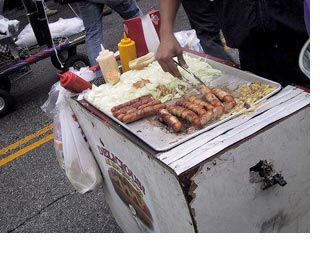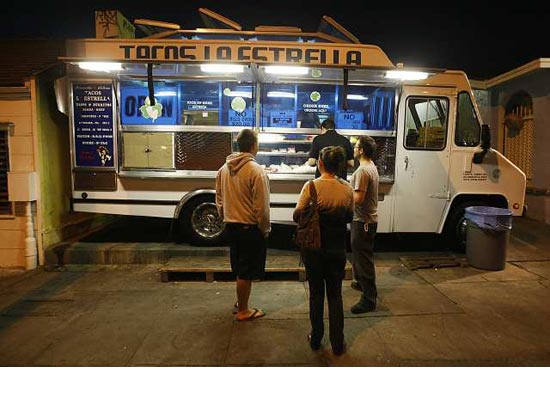New on the mobile menu: letter grades [updated]
September 14, 2010
As Los Angeles County prepares for a new public health initiative to bring restaurant-style letter grades to the region’s growing food truck fleet, it’s also setting its sights on the ubiquitous—and frequently renegade—pushcarts that peddle everything from fresh fruit to bacon-wrapped hotdogs.
A proposed ordinance scheduled for a vote by the Board of Supervisors next week initially would bring the letter grading process—including more frequent inspections and a requirement that the itinerant vendors provide the county with information on their routes—to an estimated 6,000 mobile food trucks. If the ordinance amending the county code is approved by supervisors, the grading system would be extended to some 3,500 food carts by July 1, 2011.
The move comes as Los Angeles’ mobile food scene continues to boom, with trucks now peddling everything from the traditional tacos and breakfast burritos to Korean BBQ, grilled cheese sandwiches and red velvet mocha whoopee pies.
Mobile food purveyors “are becoming more common, and also people are asking us: ‘What about these food carts?’ ” said Dr. Jonathan E. Fielding, the county’s director of Public Health. He said letter grades for food trucks and carts are an extension of the county’s12-year-old restaurant grading system, which he called “the signature program of this department.”
But as public health officials move to step up regulation of the legitimate mobile vendors, they’re also engaged in constant skirmishes with the outlaws, many operating from makeshift carts with jury-rigged cooking surfaces.
Terrance A. Powell, director of the public health department’s Bureau of Specialized Surveillance & Enforcement Environmental Health Division, said the county’s off-the-grid food scene is “extremely pervasive.”
He estimates there may be as many as 6,000 illegal vendors slinging hash (or, more likely, hotdogs or fruit) from carts or other mobile venues in the county.
They’re active enough to keep four or five flatbed trucks busy in regular raids that yield enough confiscated carts and the occasional rogue catering truck to fill a department warehouse. (A second warehouse in northern Los Angeles County would be helpful in keeping up with the illicit equipment overload, Powell said.)
He said the outlaw operators range from people “selling tamales out of trucks” to those who set up a “full-fledged restaurant after dark in the parking lot.”
The public health department’s raids, undertaken in conjunction with local law enforcement officials, take place at least weekly, usually after dark, in response to public complaints of illegal vending. When confronted, the operators often disappear into the night.
“A lot of times they’ll simply walk off and abandon everything,” Powell said. “Many times the operators intentionally don’t have any identification.”
 The proposed letter-grading ordinance has the support of most law-abiding food truck vendors, Powell said. Many of them have gone to great lengths to follow the county’s rules, which include obtaining public health department certification and operating out of officially-approved commissaries where they can dispose of wastewater and properly clean their vehicles
The proposed letter-grading ordinance has the support of most law-abiding food truck vendors, Powell said. Many of them have gone to great lengths to follow the county’s rules, which include obtaining public health department certification and operating out of officially-approved commissaries where they can dispose of wastewater and properly clean their vehicles
“I think, in general, everybody bought into it,” Powell said. “Having the grade on the vehicles is an easy identifier for the public to discern which are legal and which are illegal,” he said.
Vendor fees paid to the county—which range from $695 a year for a full-fledged catering truck to $301 for a simple pushcart selling prepackaged items—would not initially change under the new county ordinance, but could be raised later if cost analysis studies show an increase is warranted to cover the cost of the program. Health officials said they may be carrying out more inspections under the new system because they’ll be able to more easily locate the roving food-sellers, who would now be required to report their routes to the county. Like the restaurant-grading system, the new measure also would need approval by individual cities within the county.
Molly Taylor, whose Sweets Truck offers an array of upscale goodies to customers around town, said she supports the proposed grading system.
“I think a letter grade is great. My truck is cleaned every day from top to bottom,” Taylor said. She admits to some trepidation about new layers of bureaucracy coming not just from the county but from the city of Los Angeles, where new regulations also are being considered. But “hopefully, it will be for the greater good,” she said.
So popular is the food truck boom that some brick-and-mortar eateries are getting in on the act as well. And there, too, operators see the upside of doing business by the letters.
Bonnie Bloomgarden, who runs the Canter’s Truck, a mobile offshoot of the famed Fairfax Avenue deli, said the grades could be a helpful development in public education about the food-on-the-go industry.
“I think a lot of people still don’t understand that trucks have the same standards as a restaurant,” Bloomgarden said. “We pay rent, we pay taxes, we get inspected all the time. This is a way for people to know that our standards are high.”
Posted 9/14/10
Updated 10/12/10: The dining public is about to find out which local food trucks make the grade—literally.
The Los Angeles County Board of Supervisors today voted to extend the county’s successful and highly popular restaurant-grading system to mobile food vendors. The new ordinance amending the county code will apply first to 6,000 or so food trucks, and eventually will cover some 3,500 food carts, too.
For the new food truck ordinance to take hold countywide, local cities will need to sign on as well. Widespread participation is expected from the cities, which have overwhelmingly passed ordinances adopting the restaurant-grading system.
Terrance A. Powell, director of the public health department’s Bureau of Specialized Surveillance & Enforcement, Environmental Health Division, said the new regulations mark a major cultural shift in the food world.
“I think there is a realization now that mobile vending is a viable part of food service,” he said in an interview after the supervisors’ vote. “You don’t hear people refer to them as ‘roach coaches’ anymore.”
If adopted by supervisors on a second reading next week, the food truck ordinance will take effect in 30 days.
Updated 10/7/10: Supervisors on Tuesday, October 12, are expected to vote on this revised ordinance to post letter grades on food trucks.













 405 bridge work causes a stink
405 bridge work causes a stink
